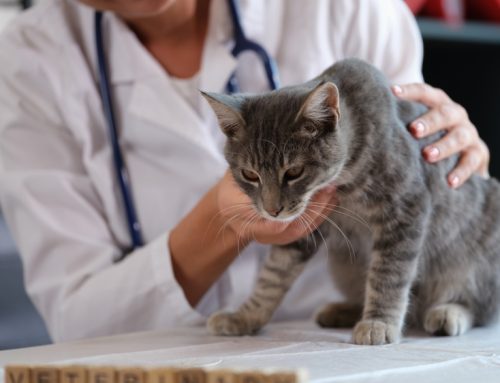Arthritis is a common problem for pets and their owners, leaving two- and four-legged creatures moaning and groaning in the morning as they convince stiff joints they need to get out of bed. As veterinary medicine advances, more and more therapies outside traditional nonsteroidal anti-inflammatory drugs (NSAIDs) are becoming available. Two products new to the American market—Librela and Solensia—are making a huge difference in the lives of cats and dogs with arthritis. Our Chiefland Animal Hospital team answers frequent questions about these new therapies to help your arthritic pet live a full, happy, and active life again.
Question: How common is arthritis in pets?
Answer: Arthritis is much more common, particularly in cats, than pet owners realize. An estimated 40% of dogs will develop arthritis in their lifetime, while more than 90% of cats older than 12 show arthritis signs. While older pets are more likely to show obvious arthritis signs, young pets can also suffer with joint dysfunction.
Q: What signs will I see if my pet has arthritis?
A: While limping or lameness are the most common arthritis signs that come to mind, not every pet will show a hitch in their step. In fact, arthritic cats rarely display lameness, likely because of their small body mass and their tremendous ability to compensate for pain and joint dysfunction.
However, although arthritis signs may be subtle, especially at the beginning of joint cartilage degradation, early identification is crucial for keeping your pet pain-free and mobile. Monitor your pet for the following arthritis signs:
- Stiffness, lameness, limping, or difficulty getting up
- Lethargy
- Reluctance to run, jump, or play
- Weight gain
- Irritability or behavioral changes
- Pain when petted or touched
- Difficulty posturing to urinate or defecate
- Accidents in the house or litter box avoidance
- Loss of muscle mass over the limbs and spine
Q: What arthritis treatment options are available for my pet?
A: Many therapies are available to help ease arthritis-driven pain and inflammation. If your pet has arthritis, they may benefit from:
- Weight management — Maintaining a healthy weight is crucial for arthritic pets, as excess weight can exacerbate joint pain. A balanced diet and regular exercise can help manage weight and should be the first “therapy” for a pet who has arthritis.
- Medications — Nonsteroidal anti-inflammatory drugs (NSAIDs) are often prescribed to reduce pain and inflammation. Other medications, like gabapentin, amantadine, and ketamine, work differently, but can still effectively manage your pet’s pain.
- Reparative therapies — Certain therapies can help heal joint damage and restore mobility by repairing joint cartilage. Platelet-rich plasma (PRP) therapy, stem cell therapy, and Adequan injections are some common therapies that can repair damaged tissue and improve joint function.
- Anti-nerve growth factor (NGF) monoclonal antibodies (mAb) — Librela and Solensia injections can help restore your pet’s mobility by controlling pain at the source. Anti-nerve growth factor monoclonal antibodies function like your pet’s natural antibodies, binding to NGF, and preventing the pain signal from reaching the brain.
- Nutraceuticals — Omega-3 fatty acids, glucosamine, chondroitin sulfate, and methylsulfonylmethane (MSM) are commonly used to support joint health and may help alleviate arthritis pain. These and other beneficial joint health ingredients can also be found in prescription diets specifically formulated for pets with joint issues.
- Rehabilitation therapies — Therapeutic exercises, massage, hydrotherapy, acupuncture, chiropractic care, laser therapy, and many other treatment modalities can help improve joint mobility, reduce pain, and promote a healthy weight.
Q: How do monoclonal antibodies work in pets?
A: Antibodies produced by the body’s immune system are proteins that attack harmful substances known as antigens. Monoclonal antibodies (mAbs) operate similarly to natural antibodies, but they are highly specific proteins that target and neutralize molecules involved in certain diseases. mAbs are eliminated from the body with minimal stress on the liver or kidneys, making them safer long-term than traditional medications.
Q: How do Librela and Solensia manage arthritis in pets?
A: Librela and Solensia are species-specific monoclonal antibody injections used to target nerve growth factor, a protein responsible for pain. By binding to NGF, these mAb injections prevent NGF from attaching to its receptors on nerve cells and interrupt pain signal transmission.
Librela and Solensia injections are administered monthly and can be used early as part of a multimodal arthritis management protocol. The minimal impact on the liver and kidneys—and no daily pill to force down—may make mAb injections an ideal therapy for your arthritic pet.
Q: What can I expect with Librela or Solensia use in my pet?
A: While Librela and Solensia are modeled after your pet’s natural antibodies, side effects can occur. Adverse reactions may include:
- Pain at the injection site
- Bacterial skin infections
- Dermatitis at the injection site
- Abnormal urination
- Urinary tract infections
- Vomiting
- Weight loss
- Elevated BUN kidney level
- Loss of effectiveness over time
Overall, these medications are generally well tolerated and can greatly improve an arthritic pet’s quality of life. Determine if Librela or Solensia is right for your four-legged friend by scheduling a consultation with our Chiefland Animal Hospital team.








Leave A Comment